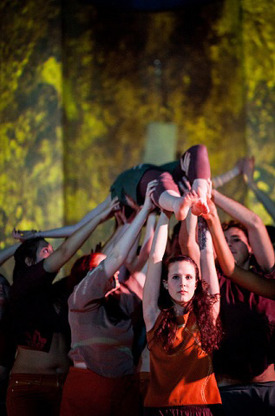Body of Water: Using the Arts to Tell Iowa's Water Story
Performance & Discussion
Wednesday, 23 Mar 2016 at 7:00 pm – Stephens Auditorium
Body of Water is a multimedia production using video, music and dance to tell the story of water usage and quality within our watersheds and communities. The performance-based project was conceived, choreographed and directed by Luther College dance professor Jane Hawley in conjunction with her Jodi Enos-Berlage, a biology professor at Luther who conducts water quality research. Originally presented in Decorah in 2015, the production highlights how small actions by individuals accumulate into a powerful force, producing an outcome that benefits all. A facilitated dialogue will follow the 1-hour performance. Part of the 10th Annual Iowa Water ConferenceAn exhibit of posters created by the Ames High School Bluestem Institute will precede the performance, 6:00-7:00pm, in the upper lobby of the auditorium. The Lexicon of Sustainability photo-mosaic posters define of water quality from a technical, social, and cultural perspective.
More information available online
The Art of Water event is part of the 10th Annual Iowa Water Conference.
Cosponsored By:
- Agronomy
- Iowa Environmental Council
- Iowa Water Center
- Leopold Center for Sustainable Agriculture
- People's Company
- Soil and Water Conservation Club
- Committee on Lectures (funded by Student Government)
Stay for the entire event, including the brief question-and-answer session that follows the formal presentation. Most events run 75 minutes.
Sign-ins are after the event concludes. For lectures in the Memorial Union, go to the information desk in the Main Lounge. In other academic buildings, look for signage outside the auditorium.
Lecture Etiquette
- Stay for the entire lecture and the brief audience Q&A. If a student needs to leave early, he or she should sit near the back and exit discreetly.
- Do not bring food or uncovered drinks into the lecture.
- Check with Lectures staff before taking photographs or recording any portion of the event. There are often restrictions. Cell phones, tablets and laptops may be used to take notes or for class assignments.
- Keep questions or comments brief and concise to allow as many as possible.



